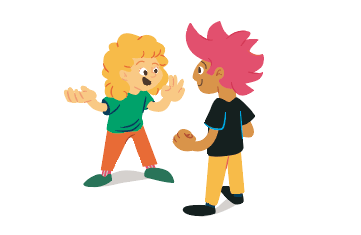Parent Handout: Preparing Your Child for Testing
Talking to kids about learning differences and disabilities is not a one-time conversation. But as a testing psychologist with limited time, it can often feel like I’ve only got one shot.
For most of my career, I’ve thought of “feedback” as a single meeting that happens at the end of an assessment. As I focus my efforts on improving this conversation, however, I’m learning that the one-shot session simply does not work!
If we want to help kids truly understand their brains, the discussion must be on-going. How do we do this within the context of assessment?

Feedback Starts Before Intake
As I’ve been searching for the most effective ways to present testing results to families, the idea that “feedback starts at the first interview” comes up often.*
This insight has been a game-changer for me in working with parents. It sets us up as partners in the assessment/discovery process, and means that by the time we get to the “official” feedback session, we’re all on the same page.
Can we do the same for children?
Yes! In fact, I’ve found that the feedback session with children actually works best when the conversation starts before they ever step foot into my office for our first meeting – in the moment their parent tells them they will be coming in for testing.
Setting Children Up for Success
Before coming in for an assessment, parents often ask, “How do I talk to my child about testing?”
Over time, I’m finding that this pre-conversation is a powerful “feedback tool” in and of itself. It can set the child up to:
- Get curious, rather than scared or suspicious about assessment
- Articulate what’s challenging for them in their own words
- Start asking questions about what they want to know
- See that this process is about the parent and the child investigating challenges together, rather than going in to find out what’s wrong with them
By providing parents with the language to have this initial conversation, the child comes in wanting to know. During testing, we can start answering their questions right away, so that they leave every session feeling like they have a little more knowledge, and a little more power, to help them learn and advocate for themselves.
Setting Parents Up for Ongoing Conversation
As noted above, conversations about learning differences and disabilities are ongoing. Often, parents are looking for guidance on how to keep these conversations going in a positive and empowering way.
By giving parents specific guidelines for how to talk to their child about the assessment process itself, we have the opportunity to frame the conversation moving forward. This means that from the beginning, parents are given the language to:
- Talk to their kids about their differences from a place of curiosity
- Involve their child as an equal partner in trying to figure out what’s making things challenging and how to solve the problem
- Highlight that all our brains are constantly changing and growing
- Identify the strengths that go along with having a different kind of brain
A Handout for Parents – in English and Spanish
Here is a handout I put together to help guide parents through that initial conversation and set their child up for a successful assessment. I hope it’s helpful to you and the families you work with!
Please feel free to share this post and the handout with others who may benefit. As always, let me know how else I can help!
*I heard this idea for the first time from Karen Postal, co-Author of Feedback That Sticks, on The Testing Psychologist podcast. The same concept is also referenced frequently in the Therapeutic Assessment literature.


